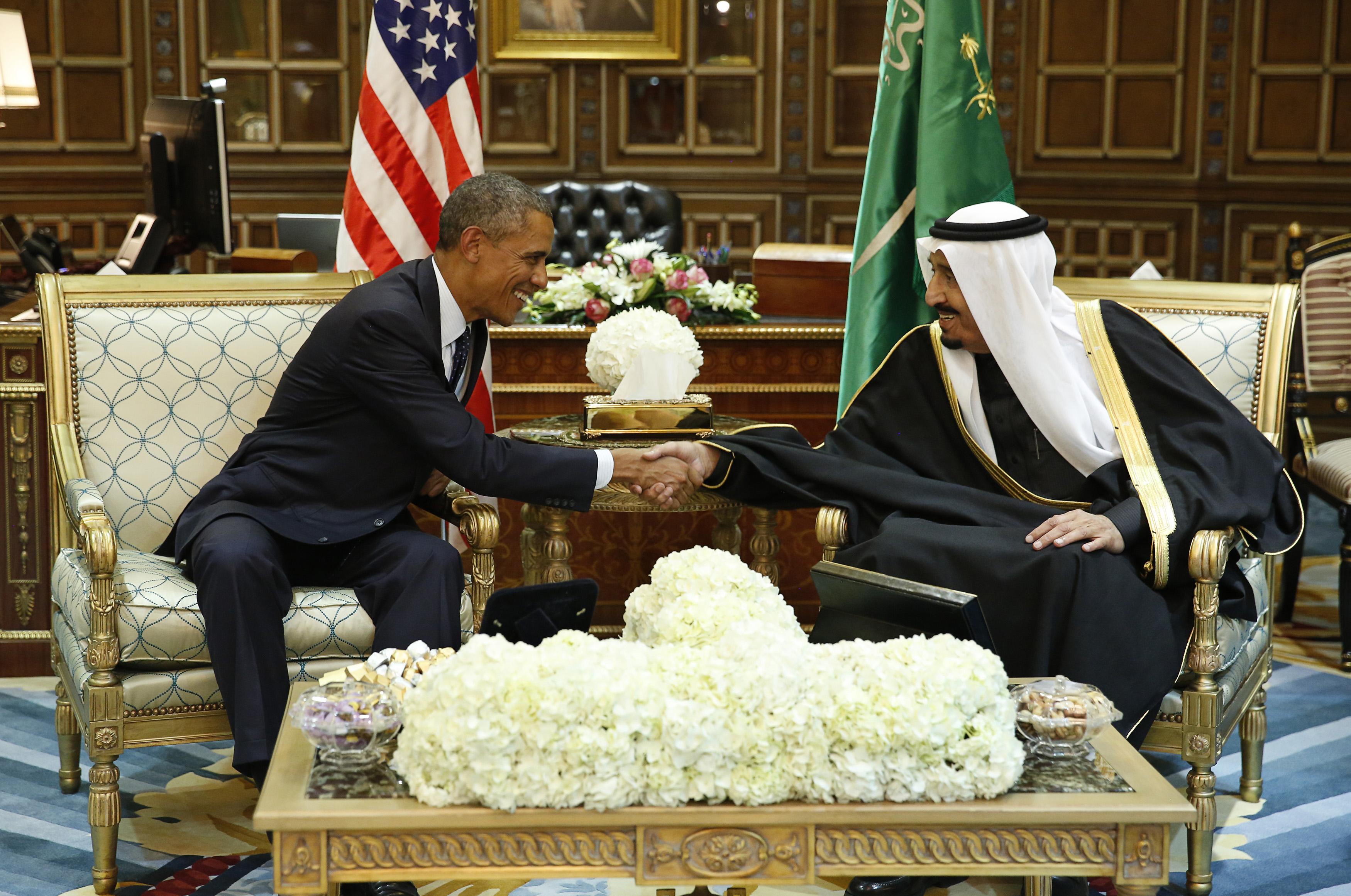It's time for America to dump Saudi Arabia
For 2016, the U.S. should break things off with its worst friend in the world


One of the many reasons it's hard to take common notions of "American exceptionalism" seriously is our longstanding alliances with vile, repressive dictatorships. It's hard to sell an image as an upstanding citizen when your best pal is Mr. Pahlavi, who runs a network of extortion scams employing murderous thugs.
Coincidentally, the latest new flashpoint in the Middle East involves our current worst best friend, Saudi Arabia, and a previous worst best friend, Iran. The Saudi regime, which oversees a nation that is largely Sunni, has been bitter enemies with largely Shia Iran since the 1979 revolution, which tossed out the U.S.-backed dictator mentioned above. Earlier this week, Saudi Arabia deliberately provoked a major diplomatic incident by executing a Shia dissident, Nimr al-Nimr. Iran retaliated by standing aside as a mob torched the Saudi embassy in Tehran; the Saudis struck back by severing diplomatic ties with Iran, which prompted several Saudi allies to do the same.
Iran is surely not blameless here. But Saudi Arabia unquestionably started this on purpose — and this is only one of its several ongoing atrocities. Its war in Yemen is a humanitarian catastrophe and a major strategic threat to U.S. interests. It is a huge source of jihadist funding and ideology. And even its oil is increasingly useless to the United States. It's time to end this alliance, and start treating Saudi Arabia like any other backward, repressive, authoritarian petro-state.
The Week
Escape your echo chamber. Get the facts behind the news, plus analysis from multiple perspectives.

Sign up for The Week's Free Newsletters
From our morning news briefing to a weekly Good News Newsletter, get the best of The Week delivered directly to your inbox.
From our morning news briefing to a weekly Good News Newsletter, get the best of The Week delivered directly to your inbox.
Let's start with the Yemen war. This is a civil war between various Yemeni factions battling for supremacy, and a proxy conflict between Iran and Saudi Arabia. The country is in ruins, millions are running short of food and water, and both al Qaeda and ISIS have gained footholds there. Since December 15th, things had been fairly quiet, but violence just flared back up again with a fresh round of Saudi airstrikes, one of which hit a treatment center for the blind.
It's pretty much exactly the kind of political chaos in which al Qaeda originally took root in the 1980s in Afghanistan — while heavily funded by individual wealthy Saudis. The Bush Administration notoriously classified 28 pages of the 9/11 Commission Report dealing with Saudi links to the attacks. Though Saudi payments to al Qaeda were eventually squelched, funding other extremist groups continues to this day. Given that ultraconservative Saudi clerics were one of the key modern sources of jihadist ideology, it's not so surprising.
And as Kevin Drum argues, their general human rights record is atrocious:
Ladies and gentlemen, this is our great and good ally. They flog apostates. They export Sunni extremism. They treat women as chattel. They flog and imprison gays. They import slave labor from abroad. They have no truck with freedom of religion or freedom of speech. Their royal family is famously corrupt. And they really, really want to start up a whole bunch of wars that they would very much like America to fight for them. [Mother Jones]
This brings up one of the major axes of contention in foreign policy: the dichotomy between realism and idealism. Oversimplifying a bit, the former camp generally argues that American national interest is the best guide to foreign policy, while the latter argues that a firm moral foundation is more important.
A free daily email with the biggest news stories of the day – and the best features from TheWeek.com
It seems to me that the general tenor of the American foreign policy establishment doesn't belong in either camp. Instead there is fervent, hyper-moralized argument whenever it supports the already-existing U.S. posture, but breezy unconcern or sheer inattention when it doesn't. Thus it's a vital national necessity to confront ISIS with the entire weight of the U.S. military because they're bad people who behead innocents, but it's barely worth mentioning when Saudi Arabia sentences a female victim of gang rape to 200 lashes for violating the segregation of the sexes.
But there's the rub, isn't it? Being hardheaded about the U.S. national interest does not necessarily imply accepting sociopathic violence. It might under some circumstances (supporting Stalin to defeat Hitler, for example), but it's hard to imagine a "realist" rubric under which the Saudi alliance actually accomplishes anything whatsoever for U.S. goals. On the contrary, they are violently destabilizing the entire Middle East (with bombs we sold them, no less), angling to undermine the hard-won nuclear deal with Iran, and have a long history of supporting or enabling America's bitterest enemies.
They do sell us oil, of course. But they could hardly stop doing that; subsidies from oil sales is about all that's keeping the tottering regime on its feet. With the rise of fracking, we need that production less and less — and a serious curtailment of oil use would necessarily be part of any (desperately needed) serious climate policy.
It's not 1973 any more. For a 2016 New Year's resolution, let's ditch our most toxic friend.
Ryan Cooper is a national correspondent at TheWeek.com. His work has appeared in the Washington Monthly, The New Republic, and the Washington Post.
-
 The UK’s supposed Christian revival
The UK’s supposed Christian revivalThe Explainer Research has shown that claims of increased church attendance, particularly among young people, ‘may be misleading’
-
 How long can Keir Starmer last as Labour leader?
How long can Keir Starmer last as Labour leader?Today's Big Question Pathway to a coup ‘still unclear’ even as potential challengers begin manoeuvring into position
-
 Child-free train carriages: has push for adults-only spaces gone too far?
Child-free train carriages: has push for adults-only spaces gone too far?Talking Point Under-12s ban on premium commuter train carriages in France sparks backlash across the political divide
-
 Israel retrieves final hostage’s body from Gaza
Israel retrieves final hostage’s body from GazaSpeed Read The 24-year-old police officer was killed during the initial Hamas attack
-
 China’s Xi targets top general in growing purge
China’s Xi targets top general in growing purgeSpeed Read Zhang Youxia is being investigated over ‘grave violations’ of the law
-
 Panama and Canada are negotiating over a crucial copper mine
Panama and Canada are negotiating over a crucial copper mineIn the Spotlight Panama is set to make a final decision on the mine this summer
-
 Why Greenland’s natural resources are nearly impossible to mine
Why Greenland’s natural resources are nearly impossible to mineThe Explainer The country’s natural landscape makes the task extremely difficult
-
 Iran cuts internet as protests escalate
Iran cuts internet as protests escalateSpeed Reada Government buildings across the country have been set on fire
-
 US nabs ‘shadow’ tanker claimed by Russia
US nabs ‘shadow’ tanker claimed by RussiaSpeed Read The ship was one of two vessels seized by the US military
-
 How Bulgaria’s government fell amid mass protests
How Bulgaria’s government fell amid mass protestsThe Explainer The country’s prime minister resigned as part of the fallout
-
 Femicide: Italy’s newest crime
Femicide: Italy’s newest crimeThe Explainer Landmark law to criminalise murder of a woman as an ‘act of hatred’ or ‘subjugation’ but critics say Italy is still deeply patriarchal
